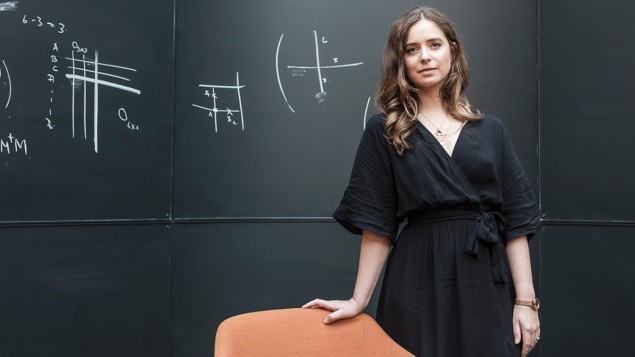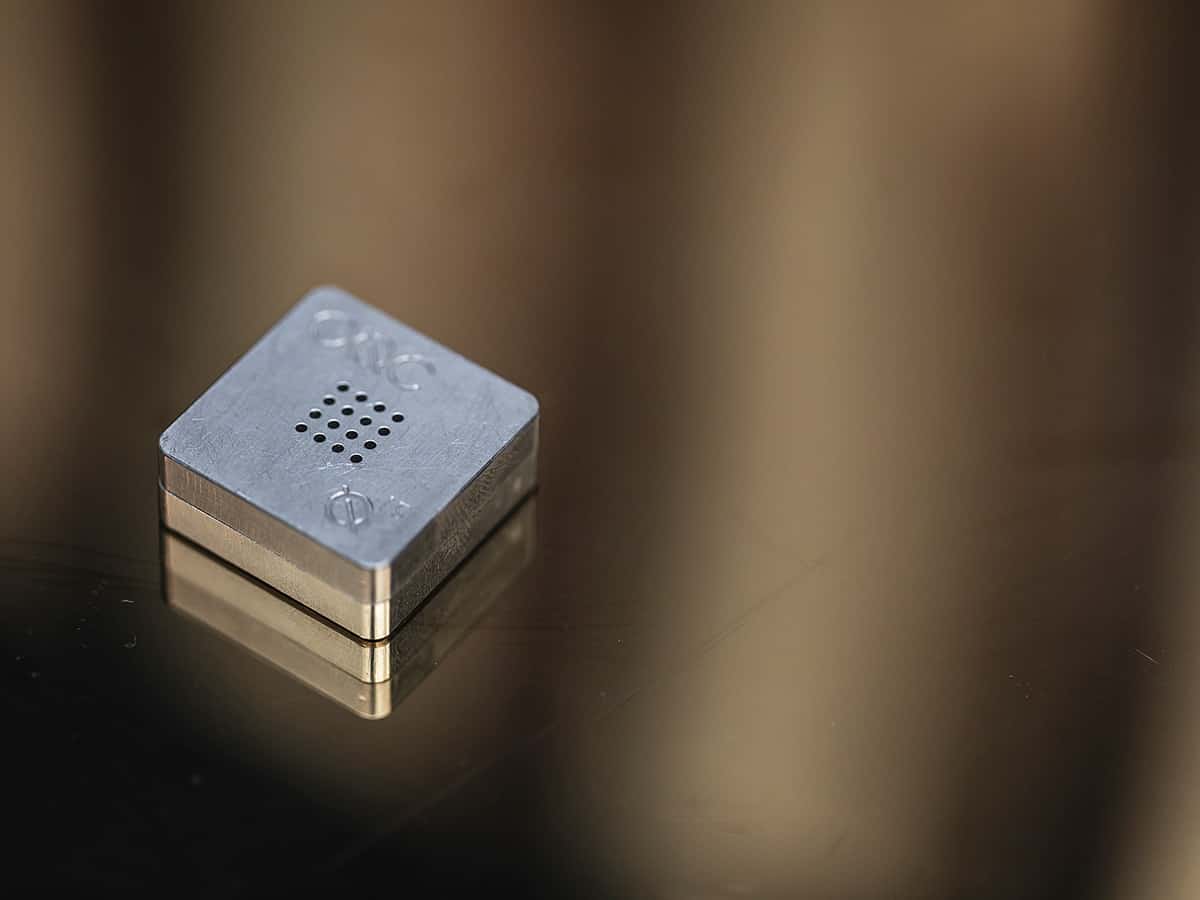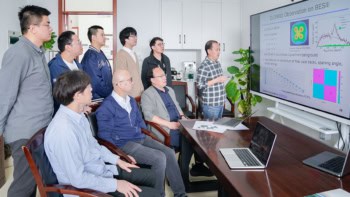Quantum physicist and chief executive of Oxford Quantum Circuits llana Wisby talks to Tushna Commissariat about deep tech, entrepreneurship and quantum technologies of the future

With an undergraduate degree in physics and music, a PhD in quantum technology and a number of years building “deep tech” start-ups from the ground up, physicist Ilana Wisby was the perfect candidate to lead and build Oxford Quantum Circuits (OQC). Founded in June 2017 by Peter Leek, OQC developed its first technology at the University of Oxford and today produces the UK’s most advanced quantum computers. Wisby talks here about her career pathway, what it means to be a leader and an entrepreneur, and how quantum technologies will change the world
Were you always keen on physics and science?
I’ve been drawn to science and technology from a young age. That was really encouraged by my parents. I remember getting electronics toys when I was six or seven and experimenting with them for hours on end. I didn’t realize until much later that these weren’t the kind of toys that many girls got to play with at that age. It fuelled my curiosity very early on.
But my passion growing up was music rather than physics, and I initially attended a specialist school to study music. I wanted to be a concert pianist, but later decided that maybe a musician’s lifestyle wasn’t the right track for me. And then I found that I really loved A-level physics, especially the problem-solving and applied thinking side of it.
So how did you pick which pathway – music or physics – you wanted to follow?
I found an undergraduate course that allowed me to study both physics and music, because I was completely non-committal to making a decision at that stage. I did my BSc in physics, with a minor in music, at Royal Holloway, University of London. That was a good way of being able to do all of the physics and feel like I had that degree under my belt, but still get to play with music and write essays. I would work in the lab, and then play the Gamelan orchestra behind the clock tower. It was so good, but sometimes a really strange experience, switching from lectures to banging gongs from the tower.
Royal Holloway had quite a small physics department at that point, with maybe around 60 people at most. It was also a Juno-accredited university and was pioneering in its efforts to attract more women into STEM. This really made a difference to me when making one of my first career choices. I went straight from my undergrad in 2012 to my PhD, working between the quantum detection group at the National Physical Laboratory (NPL) and the quantum devices group at Royal Holloway.
Can you tell me a bit about your PhD and how you came to pick quantum technology as your focus area?
Once I graduated from my BSc I immediately got a job in finance in the City of London. But I was eager to learn more. And when my former supervisor, with whom I had built a very good relationship, reached out to say that he had an available PhD position, it took me no time to decide. I ended up doing my industry-based project on hybrid quantum systems with NPL. My thesis was on coupling between locally doped spin ensembles and superconducting quantum circuits. I built international collaborations while at NPL – I was working with people in Russia and Sweden, as well as other teams at the institute.
I don’t think I really fell in love with physics until my PhD, because that’s when I got to be more hands-on and experimental. For me, the beauty of physics is when you look at the maths applied in realistic scenarios. I also really enjoyed being able to own a project and then see the maths align with something that happened in real life that I created.
You left academia soon after your PhD to work on a number of start-ups – how and why did that come about?
While I loved working on futuristic technologies in an academic setting, the pace and the lack of real-world applications got quite frustrating for me. That’s when I left academia and got into start-up ventures in the City. I worked in parallel as a data scientist at The Behaviouralist – a London consultancy that aimed to utilize behavioural interventions to reduce fuel usage in aviation – and as product director of Snap Out, a start-up working with the University of Surrey to deliver diagnosis of early-onset diabetes in remote regions in India, using diabetic retinopathy. Both these roles involved data science, but within the start-up environment, meaning everything was multidisciplinary. So along with working on data, I was also doing user experience (UX) design, managing projects for clients, creating apps, learning about finances and cybersecurity, and managing teams of people. In a start-up, you get that kind of task diversity, and you’re able to learn very quickly. I ended up as chief operations officer at Snap Out and was managing an international remote team within a few years. A common theme through my PhD and these jobs was building relationships with people, along with having the necessary technical skills.
So how did you find your way back into physics and a more technical role?
At Snap Out we were working with cutting-edge deep-tech AI, which is what I am most interested in. But irrespective of how cutting-edge this was, once you’ve done quantum technology, nothing else is quite as interesting and exciting. I also recognized that quantum, as an industry, was really starting to find its way out from academia. With my PhD and my start-up experience I realized that I was in a unique position. In 2017 I was headhunted by the lead investor of the company Oxford Sciences Innovation (OSI) to be the founding chief executive of Oxford Quantum Circuits (OQC).
You describe yourself as a “deep tech” entrepreneur – can you expand on that?
Deep tech is technology based on significant engineering shifts and new materials – it’s not simply something marginally new, it’s plain disruptive. It presents what the next revolution, or the next paradigm shift for the world, will be. Of course, it’s recognized that there’s a significant amount of R&D to do before the technology is going to be truly commercial and meaningful. From a patent capital sense, that just means that there needs to be patient longer-term investment in those types of areas.
Deep technologies have really long timescales, but will be completely revolutionary once they come through to market
With all my various roles, I’ve always been at the forefront of deep tech, and in that sense, I am a traditional deep tech entrepreneur. Within our portfolio at OSI, we’ve got deep tech for pharmaceutical companies that apply AI machine learning to drug discovery, and even nuclear fusion companies. All of these have really long timescales, but will be completely revolutionary once they come through and can be applied to a large number of market verticals that have a really high impact in the world. I really hope that in 15 years’ time, quantum is not deep tech anymore and there’s something else that has come up that is equally as exciting.
I think that was what was inspirational for me, looking at start-ups in the deep tech space. While I was interested in quantum technology because of my background, when I saw the portfolio of companies at OSI, I felt as though I could work for any of those companies and be satisfied, because they’re all so high impact and interesting. People who do science tend to be intellectually curious, but like everyone else they’re also led by what means something to them, and being able to have an impact and do something that interests them.
Entrepreneurship is primarily about leadership, and I’m very passionate about this. You can be a technical leader, as well as a leader of people. True leadership develops when you start to figure out how you can inspire others, how you can get people applying to your cause or connect dots in different ways, and do things that are slightly outside the traditional path. It’s about not being laser-focused, but instead encouraging a broad, strategic approach to things, which ultimately is all about curiosity. We can be curious beyond science; we can be curious about the world and about people; and then we can make things happen, rather than just talk about it.
What does Oxford Quantum Circuits do, what products and services do you offer?
At Oxford Quantum Circuits (OQC) we build quantum computers – we build the hardware itself, the core of the technology. When I first joined the company around three years ago, it was just a professor and a patent before I turned up with a laptop. Now, we’re a 20-person trading company, we’ve got significant government grants, we’ve just announced and launched our own independent commercial facility, and we’ve got the UK’s most advanced and only commercially available quantum computer. Indeed, we’ll be delivering quantum computers as a service to our partners and customers in the next year.
We know that quantum computers will have a huge impact on the world around us, and our vision is a brighter future for everyone that’s enabled by quantum technologies. It’s our mission to enable that by delivering hardware to the brightest minds. So we don’t build a full end-to-end system, we don’t do the algorithms, but we do the hardware and we build the core, and then we partner with the best people who are available to make it happen. Right now, we have incredibly high-quality devices that are small scale. This year is primarily about acceleration in our R&D to start scaling those systems significantly, which is all enabled by our beautiful new lab, which is incredible.

What does your role as chief executive involve?
Since I began at OQC, my role has changed continuously. And that’s true not just for me as chief exec, but for all of the team over the last few years. When we started, it was just me, and then I got a PhD student who had just graduated. We slowly started building the shape of the company and also what my role was. I was doing finance; I was reviewing legal documents; I was trying to develop strategy; I was thinking about what fundraising needed to look like; I was learning what having a board meant. I had to learn the full depth of my responsibilities, while trying to be both visionary and high level, but when it’s that size of company and a start-up, it’s 100% all hands-on-deck. No job is too small or too big for anybody. That’s what makes working in a start-up fun at that stage.
Our team members come from different backgrounds. Some of them are straight out of PhDs, some are still in university, some don’t have PhDs or university degrees at all, which is fantastic. I’m trying to build a diverse team from diverse backgrounds and especially in science, that can be really hard. One of the perks of doing this job and having this role is being able to have real influence, so that’s not a responsibility that I take lightly at all.
As the team grew and evolved, so did I. I wouldn’t recognize myself from where I was when I started. It’s been completely super-charged, and that’s enabled by the support of the people I have around me, but also the drive and the thirst to continue to learn and to be better. That doesn’t stop at university, it’s a mindset, this growth mindset, and understanding what goes into that as a leader is very important. So when I’m coaching my team, they’re not just technologists, they’re my team. One of our values is to cultivate love, and that’s important, right? It’s not fluffy –sometimes it’s tough love.
As a leader now, as a chief executive, it’s my job to set the strategy, to set the culture, to bring the money in, to make sure that I’m coaching and growing the company at the rate we all need to develop at in order to be successful and to achieve our milestones. And it’s not an easy job. I work very long hours and it’s a lot of responsibility. I’ve got this team and I’m continuously having to respond to the latest crisis, whether that’s because of my team or a supplier chain breakdown, whether it’s within the sphere of my control or not, I’m continuously having to manage risk, respond, but also keep visionary and keep everybody confident and happy and fulfilled as best I can within a growing organization. But it’s ultimately a very rewarding job.
What do you know today, that you wish you knew when you were starting your career? And what’s your advice for today’s students?
Oh, that’s such a hard one, because you wouldn’t grow if you knew everything from the start! This may sound strange, but I wish I cared less and knew not to take things too personally, to be able to disconnect situations from myself so that I can look at them more objectively. I wish I had greater self-confidence and self-belief from the start. Impostor syndrome is real, and a PhD will often amplify it. It’s important to remember that everybody is trying their best.
The best advice I can offer is to be curious and to invest in relationships and people. You can always develop your technical skills, but you also require emotional intelligence. You can be the smartest, most technical person in the world, but if you can’t communicate it, or work with people, or have a good understanding of how to get the best out of yourself and others, then you’re going to be self-limiting. If you can work on anything, it should be your emotional intelligence because if you are self-aware and have a good view of how other people perceive you, then that’s going to be your most effective tool.



